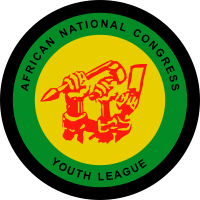African National Congress Youth League facts for kids
Quick facts for kids African National CongressYouth League |
|
|---|---|
 |
|
| President | Collen Malatji |
| Secretary General | Mntuwoxolo Ngudle |
| Founded | 10 September 1944 |
| Headquarters | Luthuli House 54 Sauer Street Johannesburg Gauteng |
| Mother party | African National Congress |
| International affiliation | International Union of Socialist Youth (IUSY) World Federation of Democratic Youth (WFDY) |
| Magazine | Hlomelang |
The African National Congress Youth League (ANCYL) is the youth part of the African National Congress (ANC). It is often called the ANCYL for short. This group helps young people get involved in politics.
The ANCYL is guided by its own rules, called a constitution. It is led by a National Executive Committee (NEC). There is also a National Working Committee (NWC) that helps with daily tasks.
Contents
How the Youth League Started
The idea for the ANCYL began in 1943 in Orlando, Soweto. Young leaders like Anton Lembede, A.P. Mda, Nelson Mandela, and Oliver Tambo met to discuss it. They felt the main ANC was too old-fashioned and not connecting with young people.
Older ANC leaders had tried talking to the government to get equal rights. But this approach was not working well. Black people were losing their rights through new laws, like those about land and jobs.
The young leaders asked Dr. Alfred Bitini Xuma, the ANC president, for permission. He was worried because their ideas were very strong. However, he allowed the discussion, and the ANC decided to create the Youth League.
First Meeting and Early Leaders
The first ANCYL meeting happened in March 1944. About 200 people attended this important event. Selope Thema, an activist, opened the meeting. Albertina Sisulu was the only woman present.
At this meeting, Anton Lembede was chosen as the first president. Victor Mbodo became vice president, Walter Sisulu was treasurer, and Oliver Tambo was secretary. Many other important people were also elected.
Lembede was a very strong leader. He believed in "militant African nationalism," which meant fighting strongly for African people's rights. Nelson Mandela said Lembede had a "magnetic personality." Lembede passed away in 1947.
Fighting Apartheid
By the late 1940s, the Youth League became very influential in the ANC. They called for protests and strikes against the new apartheid system. Apartheid was a system of laws that separated people by race and gave white people more rights.
These protests often faced strong reactions from the South African government. In 1950, 18 black people died during a protest. Many protesters, including Nelson Mandela, were jailed and beaten for standing up to the government.
Thabo Mbeki joined the Youth League in 1956. He was even expelled from high school in 1959 for taking part in a strike. In 1959, some ANCYL members left to form a new group called the Pan Africanist Congress (PAC).
In 1960, the government banned the ANC, the PAC, and their related groups. This meant they could not operate openly. Thabo Mbeki helped organize a protest before he left South Africa.
The Youth League Returns
The Youth League continued its work secretly during the apartheid years. In 1990, President F. W. de Klerk made the ANC and its groups legal again. Peter Mokaba then led the newly unbanned Youth League.
In 2005, Fikile Mbalula became the president of the league. He took over from Malusi Gigaba. Under Mbalula, the ANCYL became very active in supporting Jacob Zuma to become the ANC president.
Julius Malema was elected ANCYL president in 2008. He was re-elected in 2011. However, in November 2011, he was found to have caused problems within the ruling party. He was first suspended and then expelled from the league in April 2012. Other leaders, like Floyd Shivambu and Sindiso Magaqa, also faced suspensions.
After this, the Youth League lost a lot of its support. In 2015, Collen Maine was elected president. However, the league faced many challenges and did not hold its next elections on time. Because of these problems, the ANC decided to temporarily close down the ANCYL's leadership.
Rebuilding the Youth League
The ANC then created a National Youth Task Team to help the ANCYL get back on track. This team was made up of older ANC members. However, some young members, led by Nonceba Mhlauli and others, formed the ANCYL Crisis Committee. They argued that older members should not lead the youth league. They believed young people could rebuild their own group.
In early 2021, the ANC agreed with the Crisis Committee. They removed the Task Team and appointed a new group, the National Congress Preparatory Team. This team, led by Nonceba Mhlauli and Joy Maimela, prepared for new elections.
From June 29 to July 2, 2023, the ANCYL held its 26th National Congress. Collen Malatji was elected as the new president. Phumzile Mgcina became deputy president, and Mntuwoxolo Ngudle was elected Secretary-General. The league also added a second Deputy Secretary-General position. Tsakani Shiviti and Olga Seate were elected to these roles. Zwelo Masilela became the Treasurer-General.
Leaders of the ANCYL
Here are some of the past leaders of the African National Congress Youth League:
- Anton Lembede: 1944–1947
- A. P. Mda: 1948–1950
- Nelson Mandela: 1950–1960
- Jackie Selebi: 1987–1991
- Peter Mokaba: 1991–1994
- Lulu Johnson: 1994–1996
- Malusi Gigaba: 1996–2004
- Fikile Mbalula: 2004–2008
- Julius Malema: 2008–2012
- Collen Maine: 2015–2019
- Collen Malatji: 2023–present
 | Kyle Baker |
 | Joseph Yoakum |
 | Laura Wheeler Waring |
 | Henry Ossawa Tanner |

